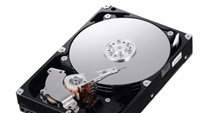Seagate buys Samsung’s hard drive business as sales shrink

Due to the growing popularity of flash memory products like the Apple’s iPad, Samsung Electronics has sold its hard drive business to Seagate Technology for $1.38 billion in cash and stock.
The deal reflects shrinking sales of hard drives and accelerates the continuing consolidation that has been occurring in the industry over the past few months. Seagate offered 45.2 million shares valued at $687.5 million and the remainder in cash, the companies said in a joint statement. They also agreed to supply each other with electronic storage devices as part of a strategic partnership.
The deal will help the industry’s second-largest storage drive producer narrow the lead Western Digital took last month when it agreed to buy Hitachi’s storage business, while giving Samsung funds to invest in more profitable businesses like health care.
In the past two years hard drive makers have had to cut prices to compete against faster and smaller flash-memory chips used in electronic tablets, smart phones and some laptop computers.
“This can’t be bad for Samsung,” Han Seung Hoon, an analyst at Korea Investment & Securities in Seoul, told “Bloomberg News.” “Samsung’s hard disk business hasn’t really been making money, so with this deal, they can be more competitive.”
After the transaction, which must be approved by U.S. and international regulators, Samsung will become the second-largest shareholder of Seagate with a 9.6 percent stake and will be entitled to nominate a director, the companies said. They expect to complete the deal by the end of the year.
Samsung also agreed to supply Seagate with NAND flash memory to be used in storage devices made by Seagate. Seagate will supply disk drives to Samsung for personal computers and notebooks.
Get the TV Tech Newsletter
The professional video industry's #1 source for news, trends and product and tech information. Sign up below.
Hard disk drive shipments are predicted to drop by about 4 percent this quarter, amid competition from smaller and faster storage products, according to IHS iSuppli. Samsung and Toshiba are the biggest makers of flash memory used to store data in some laptops and tablets such as the iPad and Samsung’s Galaxy tablet.
The deal shows that Seagate is finally taking the solid-state drive (SSD) market seriously. For the past four years, SSDs have been chipping away at the fringes of Seagate’s enterprise HDD market — a segment that Seagate dominates with a 61 percent unit shipment market share.
With a solid supply agreement with Samsung, Seagate has ensured that the company will be in a leading position any time that there’s a shortage of NAND flash memory. Without such an agreement, Seagate’s currently small SSD market share and its resultant tiny level of NAND purchases would be likely to drive NAND suppliers away as they struggled to supply the needs of more significant NAND consumers.
Thus, Seagate may be assuming the sort of supply agreement on flash memory for enterprise and computer applications that Apple has experienced for its consumer applications.
